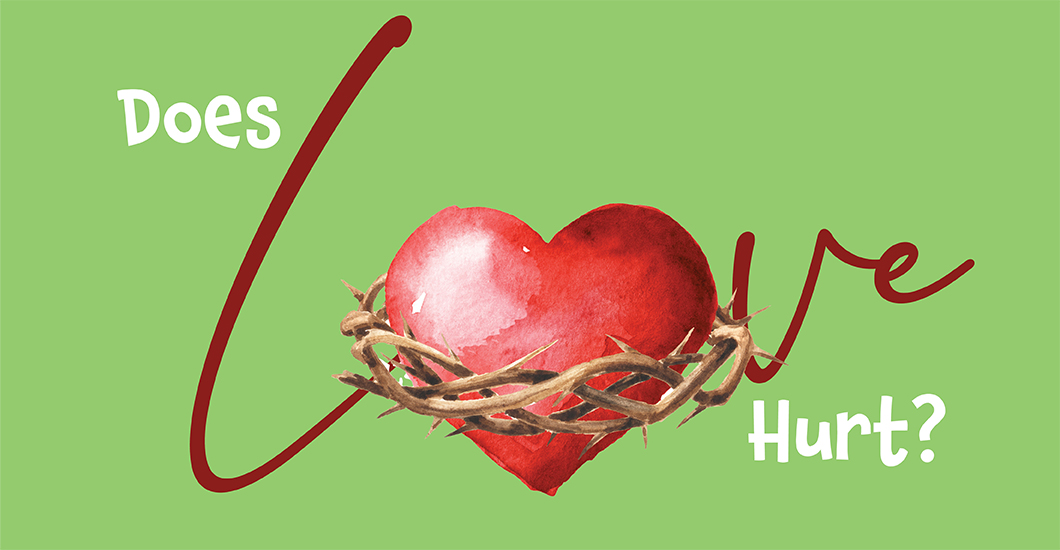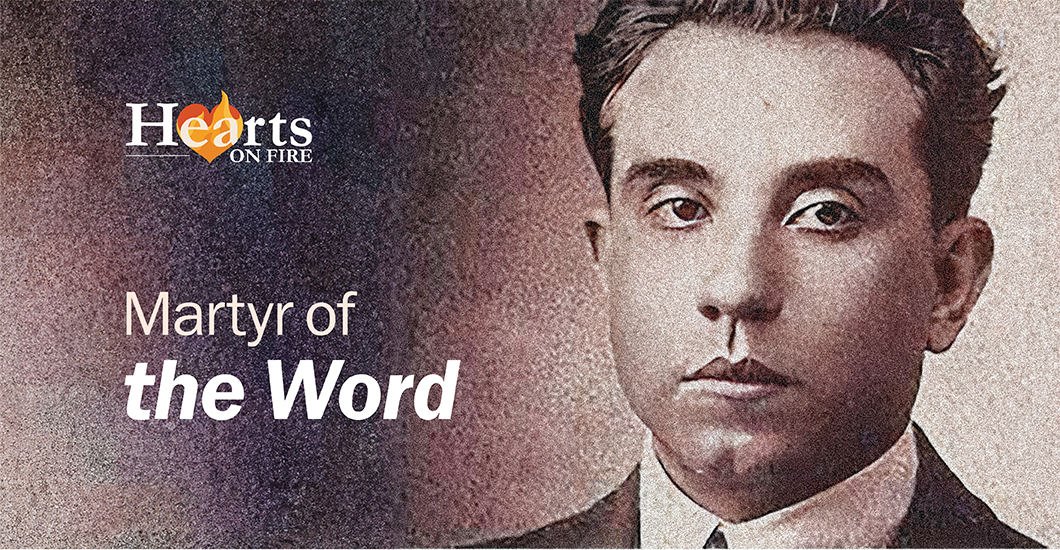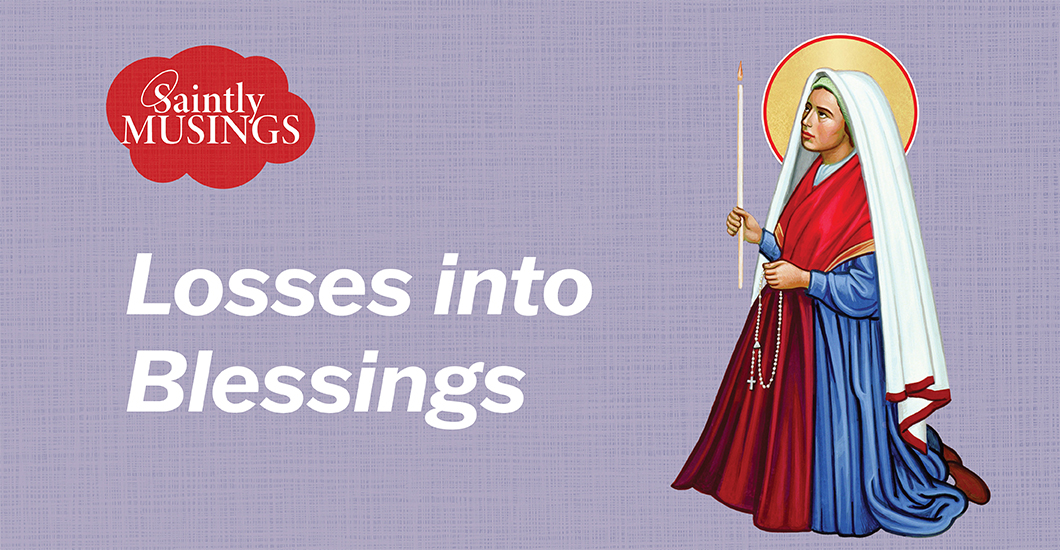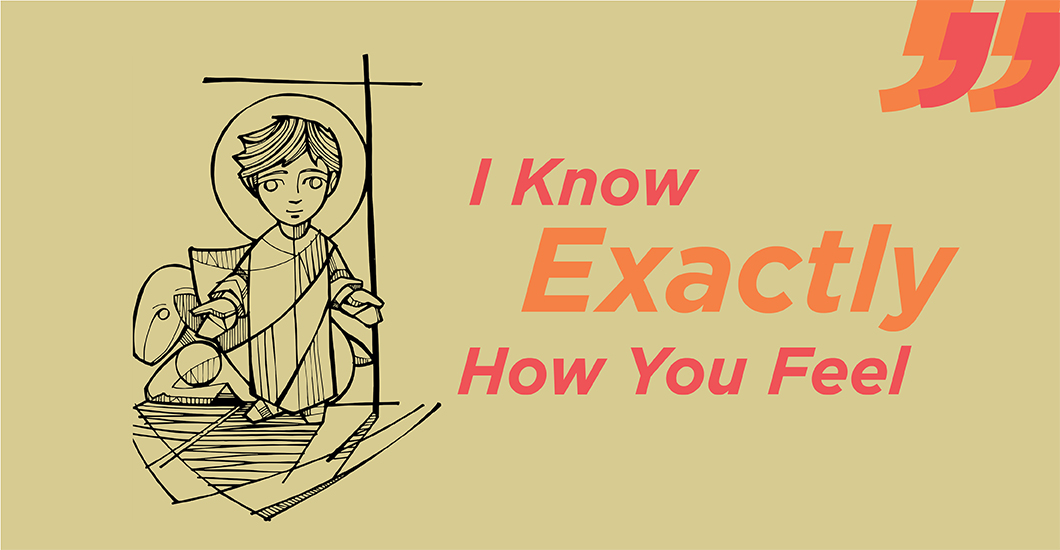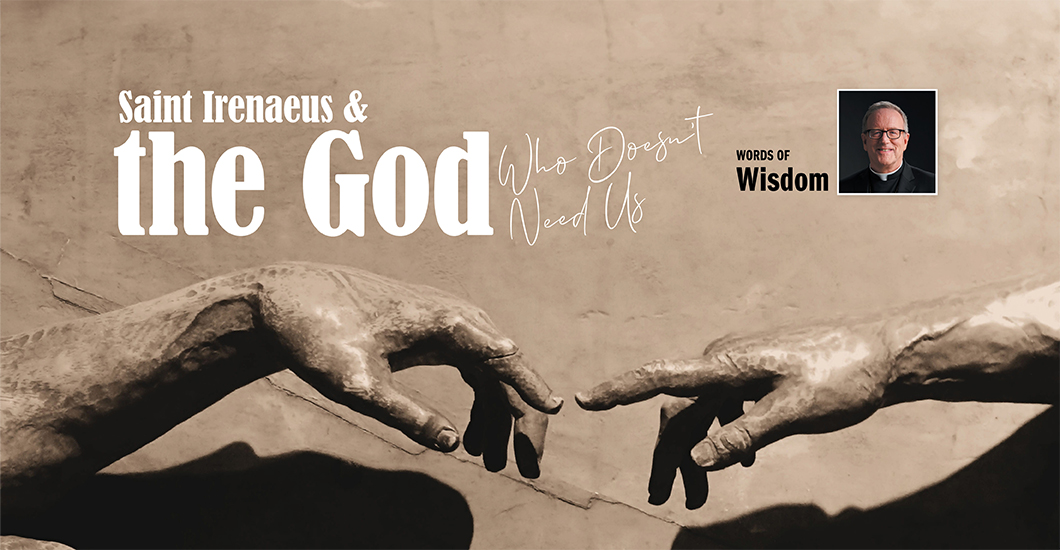Home/Evangelize/Article
Trending Articles
The Advent Challenge
Baby Jesus, peacefully nestling in His parents’ hands…it’s a beautiful image that has been reproduced in so many forms over the centuries. My personal favorite is a sleeping Mary with Joseph by the side, lovingly looking at the child in his arms.
Throughout the scary journey to an unknown land, Mary and Joseph would have done all they could to make sure that the baby they held close felt safe. They knew that this was The Savior who had come to save the world, and so, in spite of all the struggles, they sacrificed their joys for the child.
Jesus taught us to see Him in the person next to us. In fact, didn’t He come down to raise us to Him?
Every Advent, I am posed with the challenge of seeing Christ in others.
When I look at the person next to me, I wish I could see beyond the surface–his/her color, race, position, power, ugly scars, to reveal the true beauty within—the image of the Savior reflected deep within their soul. What helps me is to first take a look at myself, to recognize my weaknesses and sinful ways, and be amazed at the fact that God still loves me. If He can see beyond all these, to the possibility of who He created me to be, He can surely help me see the same Christ-like beauty in my fellow brethren.

Maria Teres Sebastian is a passionate young writer who aspires to spend her time and skills for the glory of God. She lives in Kerala, India.
Related Articles
Anacleto González Flores was born in Mexico in the late 19th century. Inspired by a sermon heard in his childhood, he made daily Mass the most important part of his life. Though he joined the seminary and excelled in academics, on discerning that he was not called into the priesthood, he later entered law school. During the years-long Christian persecution in Mexico, Flores so heroically defended the fundamental rights of Christians that the Holy See awarded him the Cross Pro Ecclesia et Pontifice for his efforts. As many Mexican Christians courageously gave their lives for their faith, he continued to write against the atrocities and became a prominent leader of the Cristero War. In 1927, he was arrested and cruelly tortured—he was flogged, his feet were cut open with knives, and his shoulder was dislocated. An unfazed Anacleto remained firm in his faith and refused to betray his fellow faithful. As he was shot to death, he openly forgave his killers and died, exclaiming: “I have worked selflessly to defend the cause of Jesus Christ and His Church. You may kill me, but know that this cause will not die with me.” He openly forgave his killers and died, exclaiming: “I die, but God does not die. Long live Christ the King!” After years of living a holy life centered on devotion to the Blessed Sacrament and an exemplary Marian devotion, Flores gave his life to the Lord with three of his fellow faithful. This brave martyr was beatified by Pope Benedict XVI in 2005, and he was declared the patron of the Mexican laity in 2019.
By: Shalom Tidings
MoreI remember a time in my ministry when I had felt a fellow minister distancing himself from me for no apparent reason. It seemed like he was struggling, but he wouldn’t share it with me. One Lenten day, burdened by this thought, I stood in my office and cried out to the Lord in my heart: “Jesus, I feel so left out of this person’s life.” Immediately, I heard Jesus respond with these sad words: “I know how you feel. It happens to Me every day.” Wow! I felt my own heart pierced, and tears flooded my eyes. I knew these words were a treasure. I continued for months to unpack that grace. Since my Baptism in the Holy Spirit twenty years ago, I had considered myself to have a deep personal relationship with Jesus. But this Word from my precious Savior and Lord opened a whole new insight into Jesus’ Heart. “Yes, Jesus, so many people forget You, don’t they? And me too—how often am I going about my tasks, forgetting to bring my problems and thoughts to You? All the while, You wait for me to turn back to You, who looks on me with such love.” In my prayer, I kept processing those words. “I know better now how You feel when someone rejects You, accuses or blames You, or does not talk to You for days or even years.” I would more consciously take my own sorrows to Jesus and tell Him: “Jesus, my Beloved, You feel this same sadness that I am feeling. I offer my little hurt to console You for so many people, including myself, who fail to console You.” I saw in a new way my favorite image, Jesus with His Sacred Heart’s rays of love flowing out, lamenting to Saint Margaret Mary: “Look at My Heart that loves people so much—but receives so little love in return.” Truly, Jesus gives me little trials daily so I can have a tiny taste of what He endured for us. I will always remember that moment of agony that brought me closer to the amazing, tender, long-suffering love of our dear Lord Jesus.
By: Sister Jane M. Abeln SMIC
MoreI lost my iPhone a year ago. At first, it felt like a limb was amputated. I had owned one for thirteen years, and it was like an extension of myself. In the beginning days, I used the “new iPhone” like a phone, but it soon became an alarm clock, a calculator, the news, weather, banking, and much more…and then…it was gone. As I was forced into detox, I had many pressing problems. My shopping lists now needed to be written on paper. An alarm clock was purchased, and a calculator. I missed the daily ‘ping’ of messages and the scramble to open them (and the feeling of being wanted). But I was sensing the peace of not having this little piece of metal dominating my life. I hadn’t realized how demanding and controlling the device was until it was gone. The world didn’t stop. I just had to relearn new-old ways of interacting with the world, like talking to people face to face and making plans for events. I wasn’t in a hurry to replace it. In fact, its demise led to a welcome revolution in my life. I started experimenting with minimal media in my life. No newspapers, magazines, radio, television, or phone. I kept an iPad for work emails, selected YouTube videos on the weekend, and a few independent news pages. It was an experiment but one that has left me feeling calm and peaceful, enabling me to use my time for prayer and Scripture. I could now cling to God more easily, who is “the same, yesterday, and today and forever” (Hebrews 13:8). The First Commandment asks us to “love the Lord your God with all Your heart and mind and soul and love your neighbor as yourself” (Mark 12:30-31). I wonder how we can do that when our mind is on our phones for most of the day! Do we truly love God with our minds? Romans 12:2 says: “Do not conform to the pattern of this world but be transformed by the renewing of your mind.” I challenge you to abstain from the media, even for a little while and even for a little bit. Feel that transforming difference in your life. Only when we give ourselves a break will we be able to love the Lord our God with renewed minds.
By: Jacinta Heley
MoreHave you been dreaming of a lasting peace that seems to somehow evade you no matter how hard you try? It is natural for us to constantly feel unprepared in an ever-changing, unpredictable world. In this scary and exhausting ordeal, it’s easy to become frightened—like a trapped animal with nowhere to run. If only we worked harder, longer, or were more in control, maybe we could catch up and finally be free to relax and find peace. I have lived this way for decades. Relying on myself and my efforts, I never really 'caught up.' I slowly realized it was an illusion to live that way. Eventually, I found a solution that has been revolutionary for me. It may feel the opposite of what is required, but trust me when I say this: Surrendering is the answer to this laborious search for peace. The Perfect Move As a Catholic, I know that I am supposed to give my heavy loads to the Lord. I also know that I am supposed to ‘let Jesus take the wheel' so that my burden would become lighter. My problem was that I did not know how to "give my burdens to the Lord." I would pray, beg, make the occasional deal, and once, even gave God a deadline (that one ended with me being schooled at a retreat by Saint Padre Pio: "Don't give God deadlines." Message received!). So, what are we to do? As humans, we base everything on a pixel of information we have at our disposal and an excruciatingly minute understanding of all factors, natural and supernatural. While I may have my thoughts on the best solutions, I hear Him loud and clear in my head: "My ways are not your ways, Barb, nor are my thoughts your thoughts," says the Lord. Here's the deal. God is God, and we are not. He knows everything—past, present, and future. We know squat. Of course, God, in His all-encompassing wisdom, understands things better than us, as well as the perfect move to make in time and history. How to Surrender If nothing in your life is working by all your human efforts, surrendering them is essential. But surrendering doesn’t mean looking at God as a vending machine whereby we put in our prayers and select how we want Him to answer. If, like me, you are struggling to surrender, I would love to share the antidote I found: the Surrender Novena. I was introduced to it a few years ago and am grateful beyond words. Servant of God, Father Don Dolindo Ruotolo, Spiritual Director to Padre Pio, received this Novena from Christ Jesus. Each day of the novena brilliantly speaks to every individual in ways only the Lord would know how to address. Rather than the same repetitive words each day, Christ, who knows us all too well, reminds us of all the ways we tend to get in the way of authentically surrendering, thus impeding the Master's work in His own way and time. The closing statement: "O Jesus, I surrender myself to you, take care of everything," is repeated ten times. Why? Because we need to believe and fully trust in Christ Jesus to perfectly take care of everything.
By: Barbara Lishko
MoreJudging others is easy, but often enough, we go totally wrong in our judgment about others. I remember an old fellow who used to come to Saturday night Mass. He was much in need of a bath and clean clothes. Quite frankly, he stunk. You can't blame those who didn't want to be subject to this awful smell. He walked two or three miles every day around our little town, picking up trash, and lived in an old, run-down shack all by himself. It is easy for us to judge appearances. Isn't it? I suppose it is a natural part of being human. I don't know how many times my judgments about a person were totally wrong. In fact, it is quite difficult, if not impossible, to look beyond appearances without God's help. This man, for instance, despite his odd personality, was very faithful about participating in Mass every week. One day, I decided I would sit next to him at Mass regularly. Yes, he stunk, but he was also in need of love from others. By God's grace, the stink didn't bother me much. During the sign of peace, I would look him in the eye, smile, and greet him with a sincere: “Peace of Christ be with you.” Never Miss This When I entertain judgments about a person, I miss the opportunity that God wants to give me—an opportunity to see beyond the physical appearance and look into the person's heart. That is what Jesus did to each person He encountered on His journey, and He continues to look beyond our yuck and look at our hearts. I remember a time, being many years away from my Catholic faith, I sat in the Church parking lot, trying to muster enough courage to walk through the doors to attend Mass. I was so afraid that others would judge me and not welcome me back. I asked Jesus to walk in with me. Upon entering the Church, I was greeted by the Deacon, who gave me a big smile and a hug, and said: “Welcome.” That smile and hug were what I needed to feel like I belonged and was home again. Choosing to sit with the old man who stunk was my way of “paying it forward.” I knew how desperately I wanted to feel welcomed, to feel that I belonged and I mattered. Let us not hesitate to welcome each other, especially those who are difficult to be around.
By: Connie Beckman
MoreLife is full of unexpected turns. Nearly six years after the death of her mother, Bernadette had to suffer the loss of her father too. Since leaving Lourdes to join the religious order, she never had a chance to see him. When assailed by this sudden demise, this is how Bernadette found strength—A sister found her crying in front of a statue of the Virgin Mary, and when the sister tried to console her, she said: “My sister, always have great devotion to the agony of our Savior. Last Saturday in the afternoon, I prayed to Jesus in agony for all those who would die in that moment, and it was precisely the very moment my father entered eternity. What a consolation it is for me to have helped him.” For Bernadette, the Saint who, as a little girl, had the apparition of Mary at Lourdes, life was not without troubles. She had to go through many tribulations; big and small humiliations bombarded her. She often said: “When my emotions are too strong, I remember the words of Our Lord: 'It is I, don’t be afraid.' I immediately appreciate and thank Our Lord for this grace of rejection and humiliation from those in authority. It is the love of this Good Master who would remove the roots from this tree of pride. The more little I become, the more I grow in the Heart of Jesus.”
By: Shalom Tidings
MoreIt was July 1936, the height of the Spanish war. El Pelé was walking through the streets of Barbastro, Spain, when a huge commotion captured his attention. As he rushed to the source, he saw soldiers dragging a priest through the streets. He couldn’t just stand on the fringes and watch; he rushed to defend the priest. The soldiers weren’t intimidated and shouted at him to surrender his weapon. He held up his rosary and told them: “I have only this.” Ceferino Giménez Malla, fondly known as El Pelé, was a Romani—a community often pejoratively referred to as Gypsies and looked down upon by mainstream society. But Pelé was held in great esteem not only by his own community, even educated people respected this illiterate man for his honesty and wisdom. When he was arrested and imprisoned in 1936, his wife had passed away, and he was already a grandfather. Even in prison, he continued to hold fast to his rosary. Everyone, even his daughter, begged him to give it up. His friends advised him that if he stopped praying, his life might be saved. But for El Pelé, to give up his rosary or to stop praying was symbolic of denying his faith. So, at the age of 74, he was shot dead and thrown in a mass grave. This brave soldier of Christ died shouting: "Long live Christ the King!" still holding a rosary in his hands. Sixty years later, Blessed Ceferino Giménez Malla became the first of the Romani community ever to be beatified, proving again that the Savior is ever-present to everyone who calls upon Him, irrespective of color or creed.
By: Shalom Tidings
MoreTo be good at anything, we have to put time, effort, and practice into it. The same applies to our preparation for eternity. How well are we going to do at the end of year exams if we have put little or no time towards studying during the year? Similarly, how well will we stand up on judgment day when we are held accountable for our lives? In our preparation period on earth for eternity, how much of our life was spent in prayer, good works, and sacrifice? Our Lord paid the ultimate price for our salvation, but we have to play our part. As He has graciously allowed us to be part of that sacrifice, let us not waste this valuable opportunity. He, through Calvary, has given us a chance to be part of His redemption, to be part of His sanctity, consequently allowing mere humans to be called into sainthood. What a privilege! As my mother would always remind us, children, this life of ours on earth, short or long, is but a preparation period, the springboard to eternity. How we fare in the structure of eternal life will be determined not only by Jesus’ death and resurrection, but by every thought, word, and deed we perpetrated during the time we spent on earth.
By: Sean Hampsey
MoreCountless times have I felt that nobody knows what I’m going through. As I struggle, I’ve yearned for someone who would look at me and say, “I know exactly how you feel.” Even those who suffer similarly cannot understand exactly what is in my heart. Often, at those times, it seems that human love falls short of what I crave. People don’t live up to my expectations for what I desire in love, and often, I fall short of others’ expectations for love. Yet during those times, I realized that everything I desire is possible. At Christmas time, we see how God became man so that He could feel everything that we feel in our human weakness. He knows what it means to suffer as we do. This serves to remind us that there is someone who understands our pain, someone who suffers with us. The fact that God chose to become human for me demonstrates the magnitude of His love. That love and understanding I crave from human beings is demonstrated in the choice God made to sacrifice Himself for me by becoming human. There is no greater love story ever written than our God becoming a tiny dependent baby, all for us!
By: Sarah Barry
MoreFor years I struggled with gluttony not realizing the root cause behind my overeating Yesterday, as I was getting ready for Mass, I was thinking about my continuing battle with overeating. Though I may not appear visibly overweight to the average person, I know that I eat more than I should. I eat even when I am not hungry, just because the food is there and I am tempted by it. Since I had finished dressing for Mass before my husband was ready, I decided to open a Saint Jude prayer book that I use every night for prayer to see if it also had a Morning Prayer. As I flipped through the pages, I came across a prayer for addictions which I had never noticed before. As I said the prayer, I especially asked God to heal me of my food addiction. Although I had tried to overcome the desire to overeat for years, my efforts had failed. Driving Away At Mass, the Gospel Reading was Mark 1:21–28. I said to myself, “In the same way that Jesus can drive the evil spirit out of this man, He can drive this spirit of gluttony out of me because this is how the evil one still has a hold on my life.” I felt that God was reassuring me that He could and would drive out this spirit of gluttony from me. My feelings were strengthened by the priest’s homily. In his homily, he listed many types of evil spirits we need deliverance from, such as anger, depression, drugs, and alcohol. The one he struggled with the most was food addiction. He explained how he lost forty pounds, only to gain back thirty. He added that no matter how much he has tried to stop himself, he always gives in to the temptation to overeat, thus committing the sin of gluttony. Everything he described related directly to me. He reassured us that Jesus came and died to set us free, so we cannot give up hope no matter how hopeless we feel, because hope is always there. Jesus gives us hope because He overcame death and rose again. We can thus claim victory because He has defeated the power of sin in our lives. We simply need to trust that Jesus will come to our rescue, in His own time. When we are slow to realize that we cannot do anything without His help, God sometimes allows us to be in positions where we feel helpless. This morning, during my morning prayer, I opened my book of daily reflections to a reading focused on finding peace. To find peace we must be in accord with God’s will. When we are in accord with God’s will, we can more effectively help others and lead them to the Lord. How can I help someone else if I am perfect? Can I understand someone else’s struggles if I have not struggled? When I am striving against a sin, like gluttony, my battle is not in vain. It is for a reason. God allows us to experience difficulties so that we can empathize with and help others and to realize that we are no better than anyone else. We all need each other, and we all need God. Strange Connection Saint Paul demonstrates this when he asserts “a thorn in the flesh” was given to him to keep him from becoming “too elated” and Christ told him that “power is made perfect in weakness”. So, he would “boast most gladly of my weaknesses, in order that the power of Christ may dwell with me.” (Corinthians 12:7–9) This Scripture teaches me that struggling with my addiction to food is meant to keep me humble. I cannot feel superior to anyone because I also struggle to overcome temptation, like everyone else, whether they believe in God or not. However, when we do believe in God, the struggles become easier because we see a purpose in continuing the battle. Many people struggle with addictions and other problems for various reasons, one of which could be due to the consequence of sin. However, when a person is a believer of God and a true follower, he or she recognizes that his or her problems are meant for the good and not as a punishment. Romans 8:28 teaches us that “all things work for good for those who love God, who are called according to His purpose.” Most importantly, this is the reality for all who are called to God’s purpose. Knowing this truth makes the difference between seeing problems, addictions, and sufferings as punishments, or as blessings that will work for our good in the long run. When a person is called by God according to His purpose, that person is fully aware of this call, so he or she accepts the good and bad in his or her life as God’s will. As I pondered, I tried to recall when my eating addiction had started. I became shamefully aware that my own addiction to food started when I confronted and condemned one of my own relatives regarding his addiction to drugs and alcohol. I can now recognize that at the same time I was angrily condemning my relative, I was slowly becoming addicted to food myself. Ultimately, condemnation and lack of forgiveness were the sources of my addiction. The Lord had to humble me by revealing, through my own addiction, that we are all weak. We all face addictions and temptations, and struggle with them in many forms. In my pride, I thought I was strong enough to overcome temptations on my own, but in falling prey to my gluttony, I discovered that I was not. Eight years later, I am still struggling to overcome my food addiction and this sin of gluttony. God cannot use us if we feel superior to others in any way. We have to be humble enough to come down to the level of those who need us, so we can help them where they are. To avoid judging others for their weaknesses, we should pray for them, extend help and offer up our own struggles for them. Isn’t this the reason why God puts sinners and those who are hurting in our path? Every time we encounter someone else, we have the opportunity to show them the face of God, so we should leave them in a better state for having come across our path, not more hurt or broken. In Luke 6:37, Jesus warns, “Stop judging and you will not be judged. Stop condemning and you will not be condemned. Forgive and you will be forgiven.”
By: Adeline Jean
MoreLatest Articles
If I hadn't gone through that darkness, I wouldn't be where I am today. My parents really wanted to have a family, but my mom wasn't able to get pregnant until she was 40. I was their miracle baby, born on her birthday, exactly one year after she completed a special Novena in petition for a child. I was gifted with a baby brother one year later. My family was nominally Catholic; we would go to Sunday Mass and receive the Sacraments, but there was nothing more. When I was about 11 or 12, my parents turned away from the Church and my faith life took an incredibly long pause. Writhing Agony Teenage years were packed with pressure, a lot of which I put on myself. I’d compare myself to other girls; I wasn't happy with my appearance. I was highly self-conscious and anxious. Though I excelled academically, I had a difficult time in school because I was very ambitious. I wanted to get ahead—show people that I could be successful and intelligent. We didn't have much money as a family, so I figured that studying well and getting a good job was going to solve it all. Instead, I got sadder and sadder. I would go for sports and celebrations, but I would wake up the next day and feel all empty. I had a few good friends, but they too had their own struggles. I remember trying to support them and ending up questioning the why of all the suffering around me. I was lost, and this sadness made me close-up and curl into myself. When I was about 15, I fell into the habit of self-harm; as I later realized, at that age, I didn't have the maturity or the ability to speak about what I was feeling. As pressure intensified, I gave in to suicidal thoughts, multiple times. During one hospitalization incident, one of the doctors saw me in such agony and said: “Do you believe in God? Do you believe in something after death?” I thought it was the strangest question to ask, but that night, I remembered reflecting on it. That's when I cried out to God for help: “God, if you exist, please help me. I want to live—I'd like to spend my life doing good, but I'm not even capable of loving myself. Whatever I do, everything ends in burnout if I don't have a meaning for all of it.” A Hand of Help I started to talk to Mother Mary, hoping that maybe she could understand and help me. Shortly after, my mother’s friend invited me to go on a pilgrimage to Međugorje. I didn’t really want to, but I accepted the invitation, more for curiosity to see a new country and nice weather. Surrounded by people who were praying the Rosary, fasting, walking up mountains, and going to Mass, I felt out of place but at the same time, I was also slightly intrigued. It was the time of the Catholic Youth Festival, and there were around 60,000 young people there, attending Mass and Adoration, praying the Rosary every day; not because they were forced to, but joyfully, from pure desire. I wondered if these people had perfect families which made it really easy for them to believe, clap, dance, and all of that. Truth be told, I craved that joy! While we were on the pilgrimage, we listened to the testimonies of girls and boys in a Cenacolo Community nearby, and that really changed things for me. In 1983, an Italian nun founded the Cenacolo Community to help young people whose lives had taken a wrong turn. Now, the organization can be found in many countries worldwide. I listened to the story of a girl from Scotland who had drug problems; she had also attempted to take her own life. I thought to myself: “If she can live that happily, if she can come out of all that pain and suffering and genuinely believe in God, maybe there's something in that for me as well.” Another great grace that I received when I was in Međugorje was that I went for confession for the first time in many years. I did not know what to expect but going to confession and finally saying out loud to God all of the things that had hurt me, all that I had done to hurt others and myself, was an enormous weight off my shoulders. I just felt peace, and I felt clean enough to make a fresh start. I came back touched and started University in Ireland, but sans adequate support, I ended up in the hospital again. Finding Way Realizing that I needed help, I went back to Italy and became a part of a Cenacolo Community. It wasn't easy. Everything was new—the language, prayer, different personalities, cultures—but there was a truth in it. Nobody was trying to convince me of anything; everyone was living their life in prayer, work, and true friendship, and it was healing them. They were living peace and joy, and it wasn't made up but real. I was with them all day, every day—I saw it. I wanted that! What really helped me those days was Adoration. I don't know how many times I just cried in front of the Blessed Sacrament. A therapist wasn’t speaking back to me, no one was trying to give me any medication, it just felt like I was being cleansed. Even in the community, there was nothing particularly special, except for God. Another thing that really helped me get out of my depression was that I started looking to serve others. As long as I kept looking at my own self, my own wounds and problems, I was just digging myself into a bigger hole. The community life forced me to come out of myself, look to others, and try to give them hope, the hope that I was finding in Christ. It helped me so much when other young people would come to the community, young girls who had problems similar to mine or sometimes even worse. I looked after them, tried to be an older sister, and sometimes even a mother. I started to think about what my mother would have experienced with me when I was hurting myself or when I was unhappy. There's often a certain sense of helplessness, but with faith, even when you can't help someone with your words, you can do so on your knees. I've seen the change in so many girls and in my own life from prayer. It's not something mystical or something I could explain theologically, but faithfulness to the Rosary, Prayer, and Sacraments has changed my life and so many other lives, and it has given us a new will to live. Passing it on I returned to Ireland to pursue a career in nursing; in fact, more than a career, I felt deeply that it's how I wanted to spend my life. I'm now living with young people, some of whom are like me when I was their age—struggling with self-harm, depression, anxiety, substance abuse, or impurity. I feel that it’s important to tell them what God did in my life, so sometimes during lunch, I tell them that I wouldn't really be able to do this job, see all the suffering and pain if I didn't believe that there was something more to life than just death after illness. People often tell me: “Oh, your name is Joy, it suits you so much; you're so happy and smiley.” I laugh inside: “If you only knew where that came from!” My joy is one that arose from suffering; that's why it's a true joy. It lasts even when there's pain. And I want the young people to have the same joy because it's not just mine, but it's a joy that comes from God, so everyone can also experience it. I just want to be able to share this infinite joy of God so that others can know that you can go through pain, misery, and difficulties and still come out of it, grateful and joyful to our Father.
By: Joy Byrne
MoreAnacleto González Flores was born in Mexico in the late 19th century. Inspired by a sermon heard in his childhood, he made daily Mass the most important part of his life. Though he joined the seminary and excelled in academics, on discerning that he was not called into the priesthood, he later entered law school. During the years-long Christian persecution in Mexico, Flores so heroically defended the fundamental rights of Christians that the Holy See awarded him the Cross Pro Ecclesia et Pontifice for his efforts. As many Mexican Christians courageously gave their lives for their faith, he continued to write against the atrocities and became a prominent leader of the Cristero War. In 1927, he was arrested and cruelly tortured—he was flogged, his feet were cut open with knives, and his shoulder was dislocated. An unfazed Anacleto remained firm in his faith and refused to betray his fellow faithful. As he was shot to death, he openly forgave his killers and died, exclaiming: “I have worked selflessly to defend the cause of Jesus Christ and His Church. You may kill me, but know that this cause will not die with me.” He openly forgave his killers and died, exclaiming: “I die, but God does not die. Long live Christ the King!” After years of living a holy life centered on devotion to the Blessed Sacrament and an exemplary Marian devotion, Flores gave his life to the Lord with three of his fellow faithful. This brave martyr was beatified by Pope Benedict XVI in 2005, and he was declared the patron of the Mexican laity in 2019.
By: Shalom Tidings
MoreSeveral years ago, I participated in the annual meeting of the Academy of Catholic Theology, a group of about fifty theologians dedicated to thinking according to the mind of the Church. Our general topic was the Trinity, and I had been invited to give one of the papers. I chose to focus on the work of Saint Irenaeus, one of the earliest and most important of the fathers of the Church. Irenaeus was born around 125 in the town of Smyrna in Asia Minor. As a young man, he became a disciple of Polycarp who, in turn, had been a student of John the Evangelist. Later in life, Irenaeus journeyed to Rome and eventually to Lyons where he became Bishop after the martyrdom of the previous leader. Irenaeus died around the year 200, most likely as a martyr, though the exact details of his death are lost to history. His theological masterpiece is called Adversus Haereses (Against the Heresies), but it is much more than a refutation of the major objections to Christian faith in his time. It is one of the most impressive expressions of Christian doctrine in the history of the church, easily ranking with the De Trinitate of Saint Augustine and the Summa theologiae of Saint Thomas Aquinas. In my Washington paper, I argued that the master idea in Irenaeus’s theology is that God has no need of anything outside of Himself. I realize that this seems, at first blush, rather discouraging, but if we follow Irenaeus’s lead, we see how, spiritually speaking, it opens up a whole new world. Irenaeus knew all about the pagan gods and goddesses who stood in desperate need of human praise and sacrifice, and he saw that a chief consequence of this theology is that people lived in fear. Since the gods needed us, they were wont to manipulate us to satisfy their desires, and if they were not sufficiently honored, they could (and would) lash out. But the God of the Bible, who is utterly perfect in Himself, has no need of anything at all. Even in His great act of making the universe, He doesn’t require any pre-existing material with which to work; rather (and Irenaeus was the first major Christian theologian to see this), He creates the universe ex nihilo (from nothing). And precisely because He doesn’t need the world, He makes the world in a sheerly generous act of love. Love, as I never tire of repeating, is not primarily a feeling or a sentiment, but instead an act of the will. It is to will the good of the other as other. Well, the God who has no self-interest at all, can only love. From this intuition, the whole theology of Irenaeus flows. God creates the cosmos in an explosion of generosity, giving rise to myriad plants, animals, planets, stars, angels, and human beings, all designed to reflect some aspect of His own splendor. Irenaeus loves to ring the changes on the metaphor of God as artist. Each element of creation is like a color applied to the canvas or a stone in the mosaic, or a note in an overarching harmony. If we can’t appreciate the consonance of the many features of God’s universe, it is only because our minds are too small to take in the Master’s design. And His entire purpose in creating this symphonic order is to allow other realities to participate in His perfection. At the summit of God’s physical creation stands the human being, loved into existence as all things are, but invited to participate even more fully in God’s perfection by loving his Creator in return. The most oft-cited quote from Irenaeus is from the fourth book of the Adversus Haereses, and it runs as follows: “The glory of God is a human being fully alive.” Do you see how this is precisely correlative to the assertion that God needs nothing? The glory of the pagan gods and goddesses was not a human being fully alive, but rather a human being in submission, a human being doing what he’s been commanded to do. But the true God doesn’t play such manipulative games. He finds His joy in willing, in the fullest measure, our good. One of the most beautiful and intriguing of Irenaeus’ ideas is that God functions as a sort of benevolent teacher, gradually educating the human race in the ways of love. He imagined Adam and Eve, not so much as adults endowed with every spiritual and intellectual perfection, but more as children or teenagers, inevitably awkward in their expression of freedom. The long history of salvation is, therefore, God’s patient attempt to train His human creatures to be His friends. All of the covenants, laws, commandments, and rituals of both ancient Israel and the church should be seen in this light: not arbitrary impositions, but the structure that the Father God gives to order His children toward full flourishing. There is much that we can learn from this ancient master of the Christian faith, especially concerning the good news of the God who doesn’t need us!
By: Bishop Robert Barron
MoreQ – How do I know if my love for sports is idolatry? I practice four hours a day, hoping to get a college scholarship, and I think about it all the time, following the professional teams closely. I love God, but He just doesn’t hold my interest like sports do. When does my passion cross the line into idolatry? A – I, too, am passionate about sports. I played baseball in high school and college, and even as a priest, I continue to play Ultimate Frisbee, soccer, and American football. Sports can be “the field of virtue,” as Saint John Paul II once said. But in our modern world, we do often hold sports in very high esteem…perhaps too high. My college baseball coach had a great saying: “Nothing in sports is eternal.” That helped me keep everything in perspective. Winning the championship or losing the game won’t make a bit of difference in eternity. It is meant to be fun, giving us a chance to exercise and practice teamwork, discipline, courage, and fairness—but there are no eternal consequences to an athletic contest. So how do we keep sports in its proper perspective? We look at three things to know if sports (or anything else) has become an idol: First, time. How much time do we spend on it versus how much time do we spend with the Lord? I once challenged a class of teens to spend ten minutes per day in prayer, and one boy told me that was impossible because he played video games. I asked him how much he played, and he told me that he often played eight to eleven hours per day! If a person doesn’t have time for a serious prayer life—fifteen to twenty minutes minimum, every day, because they are spending that time on sports, then it is indeed idolatry. This doesn’t mean that it has to be perfectly equal—if you practice for two hours per day, you don’t necessarily need to pray for two hours per day. But there does need to be enough time in your life to have a solid prayer life. This includes making sure that our sports life does not conflict with Sunday worship. My brother, an excellent ballplayer, once had to miss an important tryout because it was being held on Easter Sunday morning. Whatever we do instead of Sunday Mass becomes our idol! This also includes making time an integral part of our sacrifice for the Lord. Do you have the time to volunteer at your church or a local charity? Do you have enough time to perform your daily duties well (to do your studies to the best of your ability, to do household chores, and to be a good son/daughter and friend)? If sports take up so much time that there is no time to give back to others, then we are out-of-balance. Second, money. How much money do we spend on sports games, equipment, trainers, gym memberships—versus how much money do we give to the church, charities, or the poor? Where we spend our money determines what our priorities are. Again, this isn’t necessarily a perfectly equal ratio—but generosity is a major part of belonging to the Lord, from Whom all good gifts come. Finally, enthusiasm. In America, where I live, American football is our national religion. It amazes me to see grown men sit outside in sub-freezing temperatures at a Green Bay Packers game, with their shirts off and their chests painted team colors, wearing a foam hat in the shape of cheese (it’s a weird tradition!), cheering at the top of their lungs…and many of these same men would be bored in church on Sunday morning, barely mumbling the Mass responses (if they attended at all). What makes you excited? Are you more excited for a sports contest that won’t be remembered in a year or for the challenge and joy of the epic quest for holiness, the chance to advance the Kingdom of God, the battle for souls which has eternal consequences, the pursuit of an eternal victory which will make your trophies pale in comparison? If you find that your enthusiasm for sports is still stronger, consider what Christianity truly is. There is literally nothing more exciting and adventurous on earth than the quest to become a saint. It involves many of the same qualities as a good athlete: self-denial, dedication, and single-minded pursuit of a goal. But our goal has eternal reverberations! Considering these three things—where you spend your time, how you spend your money, and what makes you excited. These can provide valuable insight as to when something has become an idol to us.
By: Father Joseph Gill
More


